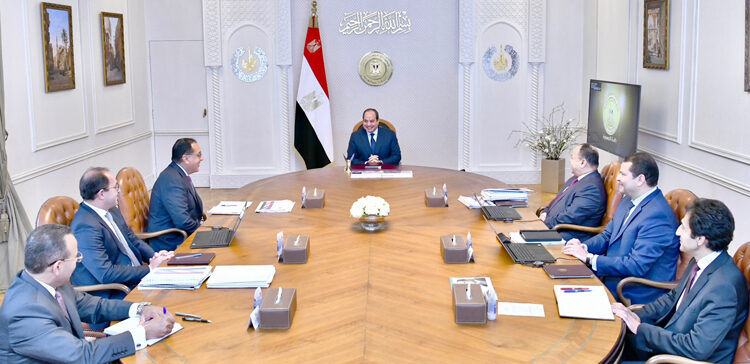Egypt’s President Abdel Fattah El Sisi was briefed on the activation of the main system of comprehensive automation in the Tax Authority as well as developments in the application of the electronic invoice system, the deadline for which has been extended to April 30, as well as the actual operation of the electronic receipt, which integrates with the electronic invoice system.
This came during President Sisi’s meeting on Tuesday with Prime Minister Moustafa Madbouli, Minister of Finance Mohamed Maeet, Deputy Minister of Finance for Financial Policies Ahmed Kajouk and Deputy Minister of Finance for the Public Treasury Dr Ehab Abu Eish, Presidency Spokesman Ambassador Bassam Radi said.
The president also followed up the developments of other work mechanisms and initiatives to combat tax evasion, the inclusion of the informal sector in those mechanisms, the real estate disposal tax system and the performance of the electronic trade follow-up unit in the Tax Authority.
The president also directed the government to continue efforts to improve the tax system in a way that helps reduce the size of the informal economy and facilitate its integration into the national economy, with the aim of achieving tax justice and preventing tax manipulation, as well as simplifying related procedures.
The financial performance for the first half of the current fiscal year 2022-2023 was presented, the outcome of which confirmed the state’s ability to deal with international economic changes, absorb shocks, maintain safe path of the general budget, provide all state needs, increase government investment allocations, and provide all basic commodities and dues for the benefit of all government agencies.
Over the past three and a half years, until last December 31, the government has transferred nearly LE600 billion to pension funds. This is very close to the original targets of the budget despite the challenges facing the global economy.
These challenges have directly affected the economic and financial conditions of all countries of the world. That period witnessed the achievement of a primary surplus of 2.3 per cent of the GDP. Moreover, budget revenues grew by about 14 per cent, while the expenditures increased by about 19 per cent.
The president also reviewed the progress of the implementation of the national economic reform programme, which is supported by the International Monetary Fund. In this respect, the government seeks to achieve all targeted reforms. It has recently approved the amendments to the Law on the Protection of Competition and Prevention of Monopolistic Practices, and ratified the state ownership policy document.
In the same context, the president was briefed on the achievements of the Tax Dispute Settlement Committees and the Tax Appeal. He directed the government to settle all open and old tax files during the current year.
With regard to the customs sector, the president followed up the current and future rates of release of goods from ports nationwide and their arrival at the markets. He called for expediting the completion of the release of all goods that came to the ports, as well as the completion of all procedures related to the governance of the customs clearance system.






Discussion about this post